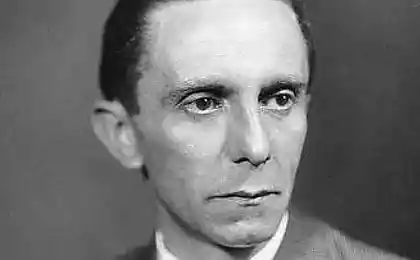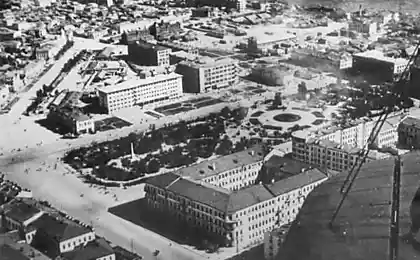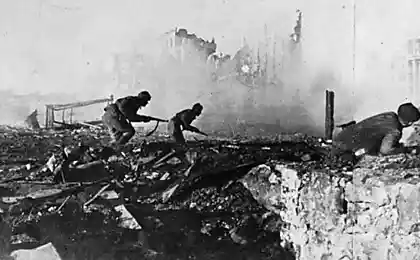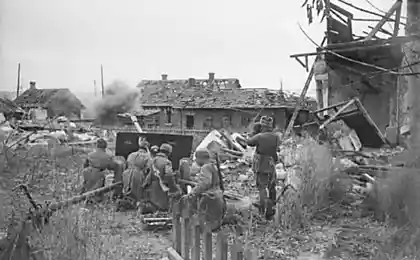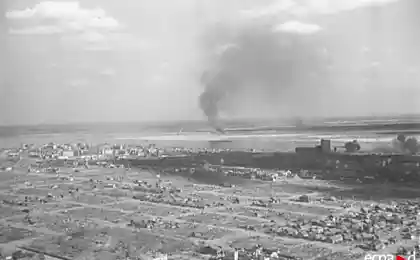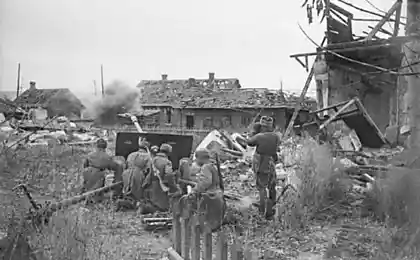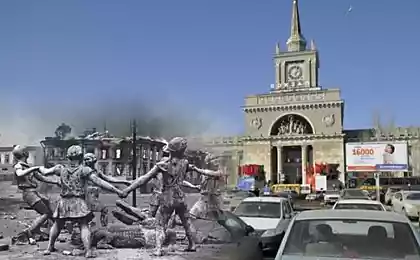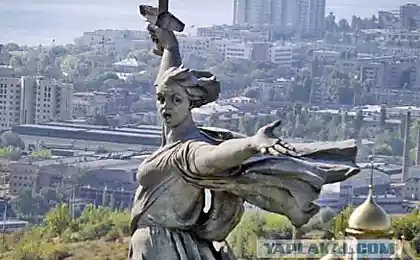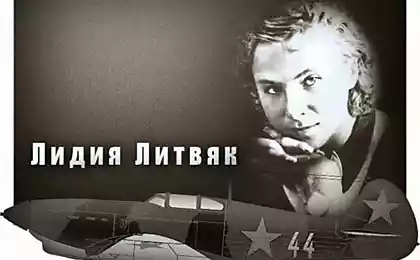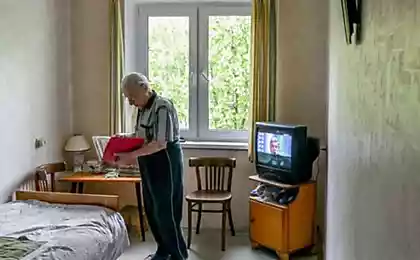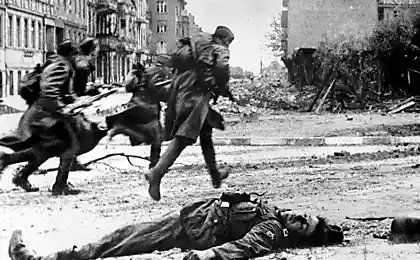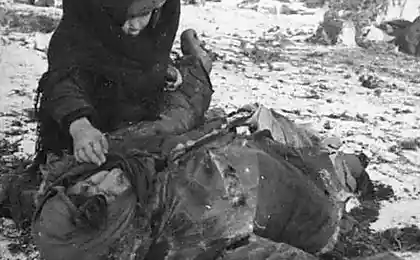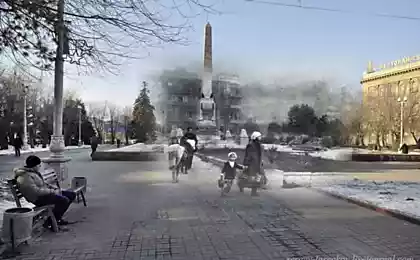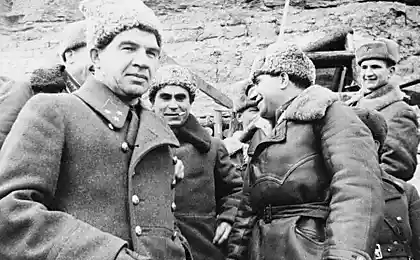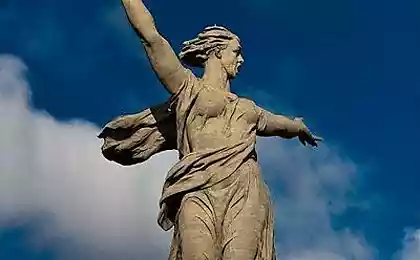843
What silent children of Stalingrad
Published book "Memories of the military children of Stalingrad" was a real eye-opener not only for the present generation, but also for war veterans.
In Stalingrad war broke suddenly. Aug. 23, 1942. Even before the people heard on the radio that the fighting is on-Don, about 100 kilometers from the city. They worked all businesses, shops, cinemas, kindergartens, schools preparing for the new school year. But that day, in the afternoon, everything suddenly collapsed. 4th German Air Force brought down a bomb on the streets of Stalingrad. Hundreds of aircraft, making one pass after another, systematically destroyed neighborhoods. The history of wars did not know such a massive destructive raid. In the city there was no accumulation of our troops, so that all efforts were directed at the enemy's destruction is the civilian population.
Nobody knows - how many thousands of Stalingrad died in those days in the basement of the collapsed buildings in earth shelters suffocated, burned alive in their homes.
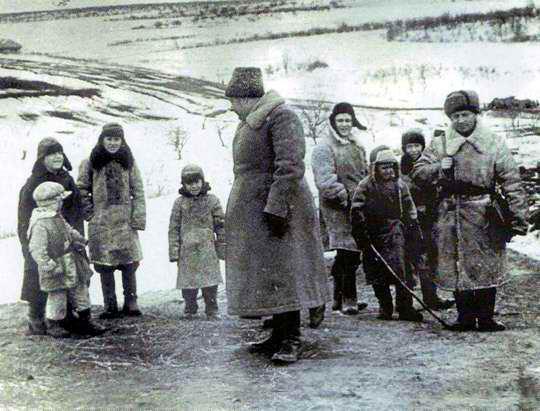
The authors of the collection - the members of the Regional Public Organization "Children of War Stalingrad in Moscow" write about what remained in their memories the terrible events.
"From his underground shelter, we ran out - says Guri acumen, he was 13 years old. - Our house burned down. Many of the houses on both sides of the street were also on fire. Father and mother grabbed us with the little sister by the hand. There are no words to describe what we have experienced the horror. All around was burning and cracked, exploded, we ran down the corridor of fire to the Volga, which because of the smoke to be seen, although it was very close. All around were heard cries of people crazed with terror. On the narrow edge of the coast has accumulated a lot of people. The wounded were lying on the ground with the dead. Upstairs, on the railway carriages with ammunition exploded. Above our heads flew railway wheels, burning wreckage. On the Volga moved burning oil flows. It seemed that the burning river ... We ran down the Volga. Suddenly saw a small tug. As soon as we went up the stairs as the ship departed. Looking back, I saw a solid wall of a burning city. "
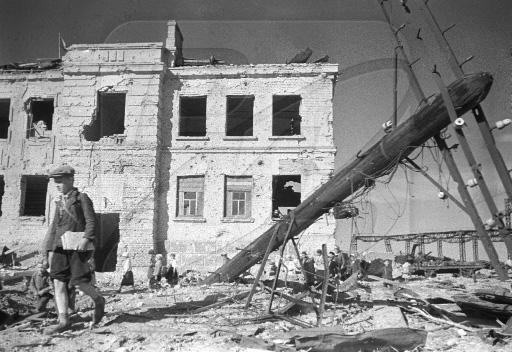
Hundreds of German aircraft down low over the river, residents were shot trying to cross to the left bank. Boatman took out people on ordinary pleasure steamers, launches, barges. The Nazis set fire to them from the air. Volga became a tomb for thousands of Stalingrad.
In his book "Secrecy tragedy of civilians in the Battle of Stalingrad" T. Pavlov quotes Abwehr officer, who was taken prisoner at Stalingrad:
"We knew that the Russian people must be eliminated as much as possible in order to prevent any manifestation of resistance after the establishment of the new order in Russia».
Soon ruined streets of Stalingrad became a battleground, and many residents, miraculously survived during the bombing of the city, expecting plight. They were captured by the German occupiers. The Germans drove people from their homes, and endless columns drove across the steppe into the unknown. Along the way, they tore the scorched ears, drank water from puddles. Throughout his life, even small children, was the fear - if only to keep up with the column - stragglers were shot.
In these cruel circumstances, events which fit to study psychology. What kind of resistance is able to show the child in the fight for life! Boris Usachev at the time was only five and a half years, when they are alone with their mother left the ruined house. Mother had to give birth soon. And the boy had become aware that he - the only one who can help her in this difficult road. They spent the night under the open sky, and Boris dragged straw that mom was easier to lie on the ground podmerzshie, collecting the ears of corn and corn on the cob. They walked 200 kilometers before they were able to find a roof - to stay in a cold barn in a remote area. Kid on the icy slope down to the hole to fetch water, collect firewood to heat the barn. In these inhuman conditions came to light girl ...
It turns out that a young child can instantly realize what danger threatens death ... Galina Kryzhanovskaya, which are under then five, recalls how she, sick, with fever, lying in a house hosted the Nazis: "I remember one the young German was the swagger of me, holding a knife to my ears, the nose, threatening to cut them, if I'm moaning and coughing. " In these terrible moments, not knowing a foreign language, one instinct she realized what she was in danger, and that she should not even squeak, not to shout, "Mom!»
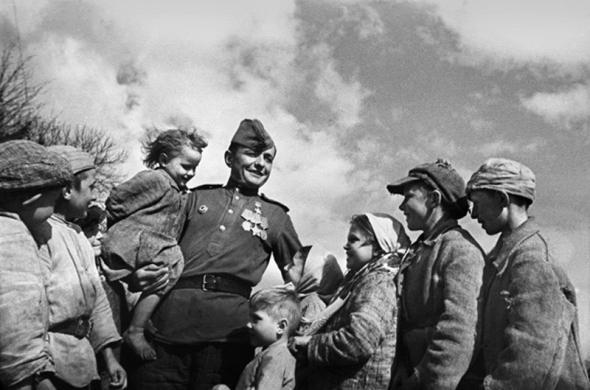
Galina Kryzhanovskaya talks about how they survived under occupation. "Hunger skin at my sister alive rot, swollen legs. At night my mother crawled out of our underground shelters, reaching out to cesspools, where the Germans dumped cleaning scraps, guts ... »
When, after the sufferings girl bathed first, then we saw her hair gray. Since the age of five she was a gray streak and went.
German troops oppress our divisions to the Volga, grabbing one by one the streets of Stalingrad. And the new columns of refugees under the protection of the occupants dragged to the west. Strong men and women were driven in cars to drive as a slave to Germany, children butts distilled off to the side ...
But in Stalingrad and were families that were left in the location of our fighting divisions and brigades. The front edge running through the streets, the ruins of houses. Caught disaster, residents took refuge in basements, ground shelters, sewers, gullies.
It is also unknown page of war, which reveal the authors of the collection. In the first days of barbarian raids were destroyed shops, warehouses, transport, roads, water supply. Stop supplying the population with food, no water. I, as a witness of those events, and one of the authors of the collection, I can testify that we have five and a half months, the city's defense civilian authorities have not been issued or of any products, no bread. However, and there was no one to give - the leaders of the city and areas immediately evacuated across the Volga. Nobody knew whether there are residents in the city to fight and where they are.
How did we survive? Only the mercy of a Soviet soldier. His compassion for the hungry and exhausted people saved us from starvation. Anyone who has survived the shelling, explosions, whistling bullets, the soldier remembers the taste of frozen bread and brew millet briquette.
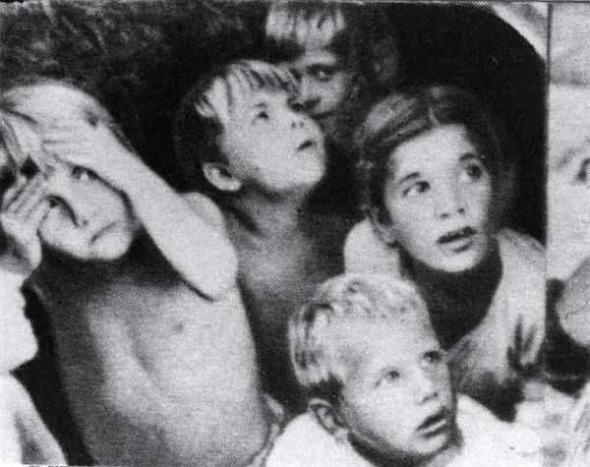
Residents knew what the dangers were exposed to the deadly fighters who with a load of food sent to us on their own initiative, the Volga. After taking Mamayev Kurgan, and other heights of the city, the Germans aimed fire sank the boat, and the boat, and only few of them come to the shore at night to our right bank.
Many regiments fighting in the ruins of the city, found themselves on the meager rations, but seeing the hungry eyes of children and women, the men shared with them last.
In our basement under a wooden house sheltering three women and eight children. Exit from the basement of porridge or water only the older children, who were 10-12 years of age: women could be mistaken for spies. Once in the ravine, where there were soldiers' kitchen, and I crawled.
I waited in shelling craters while to get there. I walked toward the soldiers with machine guns, boxes of ammunition, guns rolled. I determined the smell - a door of the dugout is the kitchen. I have trodden, not daring to open the door and ask for porridge. In front of me stopped the officer: "Where are you, girl?" After hearing about our cellar, he took me in his hut in the slope of the ravine. I put it in front of me a pot of pea soup. "My name is Paul M. Korzhenko - said the captain. - I have a son, Boris - your same age ».
The spoon shook in my hand, while I was eating soup. Pavel looked at me with such kindness and compassion that my soul fettered by fear, limp and trembled with gratitude. Still a lot of time, I'll come to him in the dugout. He not only fed me, and talked about his family, read a letter from his son. Sometimes I am talking about the exploits of fighters of the division. To me he seemed a family man. When I left, he always gave me with briquettes porridge for our basement ... His compassion for all life would be for me moral support.
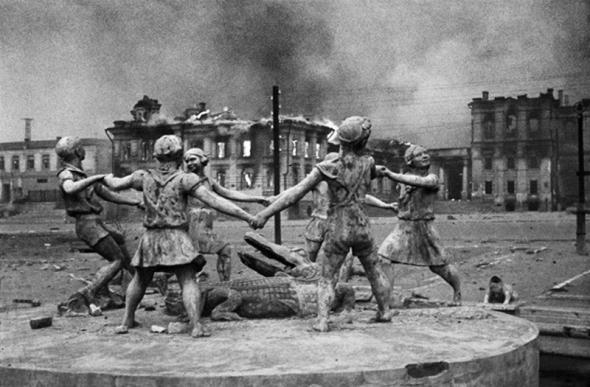
Then a child it seemed to me that the war can not destroy such a good man. But after the war, I learned that Pavel Korzhenko died in Ukraine during the liberation of the city Kotovsk ...
Galina Kryzhanovskaya describes such a case. In the cellar, where the family hid Shaposhnikov - a mother and three children, he jumped a young fighter. "How can you live here?" - He asked and immediately took his duffel bag. He laid on the bed bread and cake cereal. And immediately I jumped out. The mother of the family rushed him to thank him. And then her eyes fighter to death bullet struck. "If it was not late, would not be with us to share the bread, maybe I managed to slip a dangerous place," - she lamented afterwards.
Wartime generation of children was inherent in the early realization of their civic duty, the desire to do what was in their power to "help combat the Motherland", no matter how lofty it sounds today. But these were young Stalingrad.
After the occupation, being in a remote village, Larisa Polyakova eleven and his mother went to work in the hospital. Taking a medical bag in the cold and a blizzard every day is sent to Larisa long journey to bring to the hospital medicine and bandages. Having lived through the fear of bombing and starvation, the girl found the strength to care for seriously wounded two soldiers.
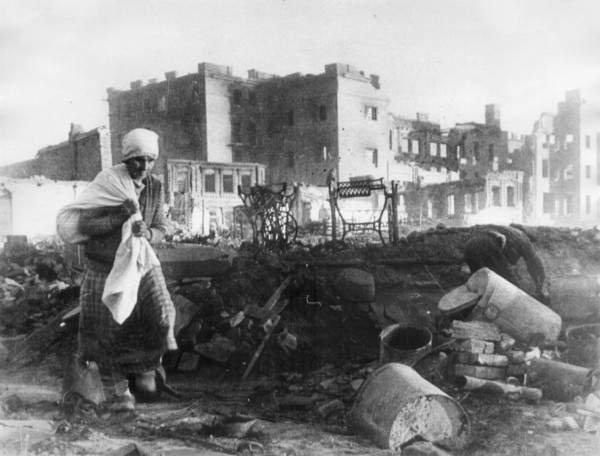
Anatoly Stolpovskikh was only 10 years old. He often absented himself from the underground shelter to get food for the mother and the younger children. But the mother did not know what Shreds constantly crawling under fire in a nearby basement, where the artillery command post. Officers noticed the enemy firing points, the team handed over the phone to the left bank of the Volga, where the artillery batteries. One day, when the Nazis made another attack, an explosion ripped the telephone wires. In the eyes of the Shred killed two signalers, who one after another, trying to reconnect. The Nazis were already in the tens of meters from the CP when Tolia, wearing a camouflage cloak, crawled to look for a place of breakage. Soon an officer previously reported gunners team. The enemy attack was repulsed. More than once in the decisive moments of battle under fire boy together a breakdown in communication. Shreds with his family was in our basement, and I was a witness to the captain, passing the mother of a loaf of bread and canned food, thanked her for bringing up such a brave son.
Anatoly Stolpovskikh awarded the medal "For the Defense of Stalingrad." With a medal on the chest, he went to study in his 4th grade.
In the cellars, ground burrows underground pipes - wherever hiding residents of Stalingrad, in spite of the bombing and shelling, warm hope - live to win. This, despite the cruel circumstances, dreamed and those who were stolen by the Germans from his native city for hundreds of kilometers. Iraida Modin, who was 11 years old, tells the story of how they met the Red Army. During the Battle of Stalingrad their family - a mother and three children, the Nazis herded into the barracks of the concentration camp. Miraculously they got out of it and the next day saw the Germans burned the barracks together with people. From disease and starvation mother died. "We were totally exhausted and looked like walking skeletons - wrote Iraida Modin. - Down - festering sores. We could hardly move ... One day our older sister Maria outside the window saw a rider on the cap which had a five-pointed red star. She opened the door and fell at the feet of the soldiers logged. I remember it in a shirt, hugging her knees one of the fighters, shaking with sobs, repeating: "Our saviors arrived. My dear! "Soldiers fed us and stroked our heads cropped. They seemed to us the closest people in the world. "
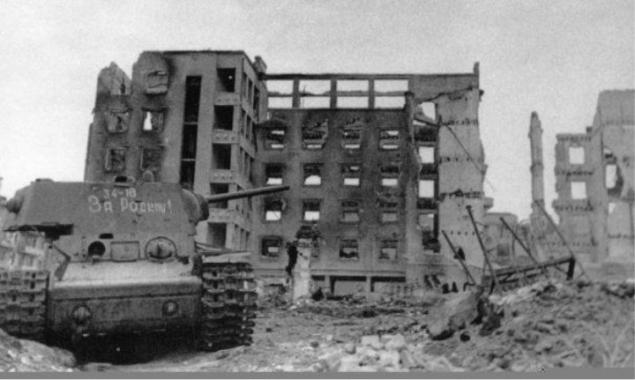
The victory at Stalingrad was an event of global scale. The town came to welcome thousands of telegrams and letters were wagons with food and building materials. In the name of Stalingrad called squares and streets. But nobody in the world to celebrate victories as Stalingrad fighters and residents of the city to survive in battle. However, in the press of those years have been reported as severe life remained in the devastated Stalingrad. Getting out of their squalid shelters, residents of long walk along narrow paths among the endless minefields, on the site of their houses were burnt chimneys, water carried from the Volga, which was still a smell of corpses, food cooked on fires.
The whole city was a battleground. And when the snow began to descend on the streets, in the funnels, factory buildings, wherever there was fighting, the bodies were found and our German soldiers. We had to bring them to the ground.
"We went back to Stalingrad, and my mother went to work at the company, which is located at the foot of Mamayev Kurgan - says Lyudmila Butenko, who was 6 years old. - From the first day all the workers were mostly women, we had to collect and bury the bodies of our soldiers who died during the storming of Mamayev Kurgan. It is only necessary to imagine that women experience, some have become widows, and others, every day waiting vestochek from the front, worrying and praying for their loved ones. Before them was the body of someone else's husbands, brothers, sons. Mom came home tired, depressed ».
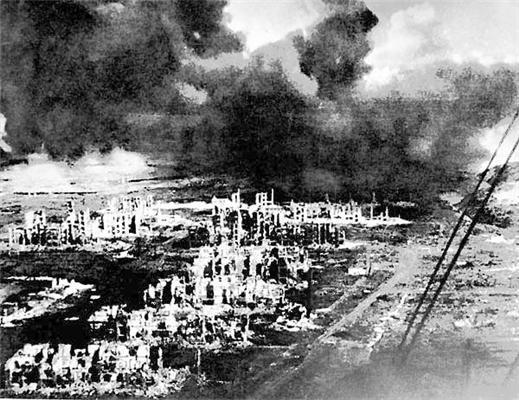
It is hard to imagine a time in our pragmatic, but only two months after the end of fighting in Stalingrad were teams of volunteer builders.
It began this way. Kindergarten worker Alexander Cherkasov has proposed its own to restore the small building to quickly take the kids. Women took up saws and hammers themselves plastered, painted. In the name of Cherkasova became known as voluntary brigade who gratuitously raised the ruined city. Cherkasovskie brigade created in broken shops, among the ruins of houses, clubs and schools. After changing its main inhabitants of two or three hours we worked, clearing the way for manually examining the ruins. Even children gathered bricks for their future schools.
"In one of these teams and joined my mother - says Butenko Lyudmila. - Residents, still recovering from the sufferings, would help rebuild the city. They went to work in rags, mostly barefoot. And surprisingly - you could hear them singing. How can we forget this? »
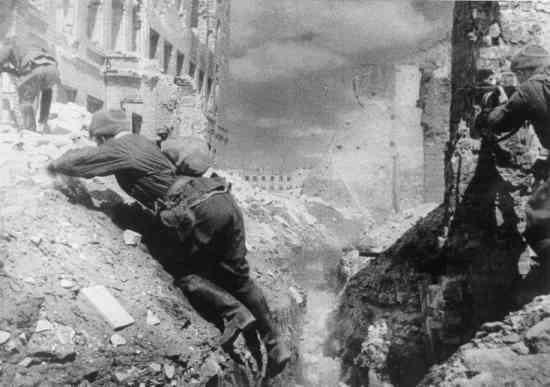
Any building in the city, which is called the House of Pavlov. Being almost surrounded, fighters under the command of Sergeant Pavlov 58 days defending this line. In the house remained the inscription: "We will defend you, dear Stalingrad!" Cherkasovtsy who came to restore the building, added a single letter, and on the wall was written: "We shall build you own Stalingrad!»
Over time, this labor of love cherkasovskih teams, which included thousands of volunteers, it is truly a spiritual feat. And the first buildings that were constructed in Stalingrad were kindergartens and schools. City concerned about their future.
Lyudmila Ovchinnikova via stoletie.ru
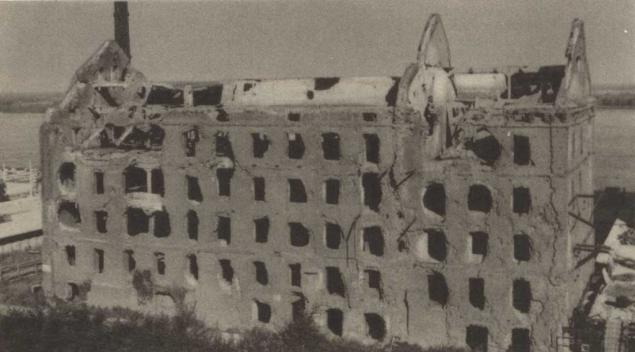
Source:
In Stalingrad war broke suddenly. Aug. 23, 1942. Even before the people heard on the radio that the fighting is on-Don, about 100 kilometers from the city. They worked all businesses, shops, cinemas, kindergartens, schools preparing for the new school year. But that day, in the afternoon, everything suddenly collapsed. 4th German Air Force brought down a bomb on the streets of Stalingrad. Hundreds of aircraft, making one pass after another, systematically destroyed neighborhoods. The history of wars did not know such a massive destructive raid. In the city there was no accumulation of our troops, so that all efforts were directed at the enemy's destruction is the civilian population.
Nobody knows - how many thousands of Stalingrad died in those days in the basement of the collapsed buildings in earth shelters suffocated, burned alive in their homes.

The authors of the collection - the members of the Regional Public Organization "Children of War Stalingrad in Moscow" write about what remained in their memories the terrible events.
"From his underground shelter, we ran out - says Guri acumen, he was 13 years old. - Our house burned down. Many of the houses on both sides of the street were also on fire. Father and mother grabbed us with the little sister by the hand. There are no words to describe what we have experienced the horror. All around was burning and cracked, exploded, we ran down the corridor of fire to the Volga, which because of the smoke to be seen, although it was very close. All around were heard cries of people crazed with terror. On the narrow edge of the coast has accumulated a lot of people. The wounded were lying on the ground with the dead. Upstairs, on the railway carriages with ammunition exploded. Above our heads flew railway wheels, burning wreckage. On the Volga moved burning oil flows. It seemed that the burning river ... We ran down the Volga. Suddenly saw a small tug. As soon as we went up the stairs as the ship departed. Looking back, I saw a solid wall of a burning city. "

Hundreds of German aircraft down low over the river, residents were shot trying to cross to the left bank. Boatman took out people on ordinary pleasure steamers, launches, barges. The Nazis set fire to them from the air. Volga became a tomb for thousands of Stalingrad.
In his book "Secrecy tragedy of civilians in the Battle of Stalingrad" T. Pavlov quotes Abwehr officer, who was taken prisoner at Stalingrad:
"We knew that the Russian people must be eliminated as much as possible in order to prevent any manifestation of resistance after the establishment of the new order in Russia».
Soon ruined streets of Stalingrad became a battleground, and many residents, miraculously survived during the bombing of the city, expecting plight. They were captured by the German occupiers. The Germans drove people from their homes, and endless columns drove across the steppe into the unknown. Along the way, they tore the scorched ears, drank water from puddles. Throughout his life, even small children, was the fear - if only to keep up with the column - stragglers were shot.
In these cruel circumstances, events which fit to study psychology. What kind of resistance is able to show the child in the fight for life! Boris Usachev at the time was only five and a half years, when they are alone with their mother left the ruined house. Mother had to give birth soon. And the boy had become aware that he - the only one who can help her in this difficult road. They spent the night under the open sky, and Boris dragged straw that mom was easier to lie on the ground podmerzshie, collecting the ears of corn and corn on the cob. They walked 200 kilometers before they were able to find a roof - to stay in a cold barn in a remote area. Kid on the icy slope down to the hole to fetch water, collect firewood to heat the barn. In these inhuman conditions came to light girl ...
It turns out that a young child can instantly realize what danger threatens death ... Galina Kryzhanovskaya, which are under then five, recalls how she, sick, with fever, lying in a house hosted the Nazis: "I remember one the young German was the swagger of me, holding a knife to my ears, the nose, threatening to cut them, if I'm moaning and coughing. " In these terrible moments, not knowing a foreign language, one instinct she realized what she was in danger, and that she should not even squeak, not to shout, "Mom!»

Galina Kryzhanovskaya talks about how they survived under occupation. "Hunger skin at my sister alive rot, swollen legs. At night my mother crawled out of our underground shelters, reaching out to cesspools, where the Germans dumped cleaning scraps, guts ... »
When, after the sufferings girl bathed first, then we saw her hair gray. Since the age of five she was a gray streak and went.
German troops oppress our divisions to the Volga, grabbing one by one the streets of Stalingrad. And the new columns of refugees under the protection of the occupants dragged to the west. Strong men and women were driven in cars to drive as a slave to Germany, children butts distilled off to the side ...
But in Stalingrad and were families that were left in the location of our fighting divisions and brigades. The front edge running through the streets, the ruins of houses. Caught disaster, residents took refuge in basements, ground shelters, sewers, gullies.
It is also unknown page of war, which reveal the authors of the collection. In the first days of barbarian raids were destroyed shops, warehouses, transport, roads, water supply. Stop supplying the population with food, no water. I, as a witness of those events, and one of the authors of the collection, I can testify that we have five and a half months, the city's defense civilian authorities have not been issued or of any products, no bread. However, and there was no one to give - the leaders of the city and areas immediately evacuated across the Volga. Nobody knew whether there are residents in the city to fight and where they are.
How did we survive? Only the mercy of a Soviet soldier. His compassion for the hungry and exhausted people saved us from starvation. Anyone who has survived the shelling, explosions, whistling bullets, the soldier remembers the taste of frozen bread and brew millet briquette.

Residents knew what the dangers were exposed to the deadly fighters who with a load of food sent to us on their own initiative, the Volga. After taking Mamayev Kurgan, and other heights of the city, the Germans aimed fire sank the boat, and the boat, and only few of them come to the shore at night to our right bank.
Many regiments fighting in the ruins of the city, found themselves on the meager rations, but seeing the hungry eyes of children and women, the men shared with them last.
In our basement under a wooden house sheltering three women and eight children. Exit from the basement of porridge or water only the older children, who were 10-12 years of age: women could be mistaken for spies. Once in the ravine, where there were soldiers' kitchen, and I crawled.
I waited in shelling craters while to get there. I walked toward the soldiers with machine guns, boxes of ammunition, guns rolled. I determined the smell - a door of the dugout is the kitchen. I have trodden, not daring to open the door and ask for porridge. In front of me stopped the officer: "Where are you, girl?" After hearing about our cellar, he took me in his hut in the slope of the ravine. I put it in front of me a pot of pea soup. "My name is Paul M. Korzhenko - said the captain. - I have a son, Boris - your same age ».
The spoon shook in my hand, while I was eating soup. Pavel looked at me with such kindness and compassion that my soul fettered by fear, limp and trembled with gratitude. Still a lot of time, I'll come to him in the dugout. He not only fed me, and talked about his family, read a letter from his son. Sometimes I am talking about the exploits of fighters of the division. To me he seemed a family man. When I left, he always gave me with briquettes porridge for our basement ... His compassion for all life would be for me moral support.

Then a child it seemed to me that the war can not destroy such a good man. But after the war, I learned that Pavel Korzhenko died in Ukraine during the liberation of the city Kotovsk ...
Galina Kryzhanovskaya describes such a case. In the cellar, where the family hid Shaposhnikov - a mother and three children, he jumped a young fighter. "How can you live here?" - He asked and immediately took his duffel bag. He laid on the bed bread and cake cereal. And immediately I jumped out. The mother of the family rushed him to thank him. And then her eyes fighter to death bullet struck. "If it was not late, would not be with us to share the bread, maybe I managed to slip a dangerous place," - she lamented afterwards.
Wartime generation of children was inherent in the early realization of their civic duty, the desire to do what was in their power to "help combat the Motherland", no matter how lofty it sounds today. But these were young Stalingrad.
After the occupation, being in a remote village, Larisa Polyakova eleven and his mother went to work in the hospital. Taking a medical bag in the cold and a blizzard every day is sent to Larisa long journey to bring to the hospital medicine and bandages. Having lived through the fear of bombing and starvation, the girl found the strength to care for seriously wounded two soldiers.

Anatoly Stolpovskikh was only 10 years old. He often absented himself from the underground shelter to get food for the mother and the younger children. But the mother did not know what Shreds constantly crawling under fire in a nearby basement, where the artillery command post. Officers noticed the enemy firing points, the team handed over the phone to the left bank of the Volga, where the artillery batteries. One day, when the Nazis made another attack, an explosion ripped the telephone wires. In the eyes of the Shred killed two signalers, who one after another, trying to reconnect. The Nazis were already in the tens of meters from the CP when Tolia, wearing a camouflage cloak, crawled to look for a place of breakage. Soon an officer previously reported gunners team. The enemy attack was repulsed. More than once in the decisive moments of battle under fire boy together a breakdown in communication. Shreds with his family was in our basement, and I was a witness to the captain, passing the mother of a loaf of bread and canned food, thanked her for bringing up such a brave son.
Anatoly Stolpovskikh awarded the medal "For the Defense of Stalingrad." With a medal on the chest, he went to study in his 4th grade.
In the cellars, ground burrows underground pipes - wherever hiding residents of Stalingrad, in spite of the bombing and shelling, warm hope - live to win. This, despite the cruel circumstances, dreamed and those who were stolen by the Germans from his native city for hundreds of kilometers. Iraida Modin, who was 11 years old, tells the story of how they met the Red Army. During the Battle of Stalingrad their family - a mother and three children, the Nazis herded into the barracks of the concentration camp. Miraculously they got out of it and the next day saw the Germans burned the barracks together with people. From disease and starvation mother died. "We were totally exhausted and looked like walking skeletons - wrote Iraida Modin. - Down - festering sores. We could hardly move ... One day our older sister Maria outside the window saw a rider on the cap which had a five-pointed red star. She opened the door and fell at the feet of the soldiers logged. I remember it in a shirt, hugging her knees one of the fighters, shaking with sobs, repeating: "Our saviors arrived. My dear! "Soldiers fed us and stroked our heads cropped. They seemed to us the closest people in the world. "

The victory at Stalingrad was an event of global scale. The town came to welcome thousands of telegrams and letters were wagons with food and building materials. In the name of Stalingrad called squares and streets. But nobody in the world to celebrate victories as Stalingrad fighters and residents of the city to survive in battle. However, in the press of those years have been reported as severe life remained in the devastated Stalingrad. Getting out of their squalid shelters, residents of long walk along narrow paths among the endless minefields, on the site of their houses were burnt chimneys, water carried from the Volga, which was still a smell of corpses, food cooked on fires.
The whole city was a battleground. And when the snow began to descend on the streets, in the funnels, factory buildings, wherever there was fighting, the bodies were found and our German soldiers. We had to bring them to the ground.
"We went back to Stalingrad, and my mother went to work at the company, which is located at the foot of Mamayev Kurgan - says Lyudmila Butenko, who was 6 years old. - From the first day all the workers were mostly women, we had to collect and bury the bodies of our soldiers who died during the storming of Mamayev Kurgan. It is only necessary to imagine that women experience, some have become widows, and others, every day waiting vestochek from the front, worrying and praying for their loved ones. Before them was the body of someone else's husbands, brothers, sons. Mom came home tired, depressed ».

It is hard to imagine a time in our pragmatic, but only two months after the end of fighting in Stalingrad were teams of volunteer builders.
It began this way. Kindergarten worker Alexander Cherkasov has proposed its own to restore the small building to quickly take the kids. Women took up saws and hammers themselves plastered, painted. In the name of Cherkasova became known as voluntary brigade who gratuitously raised the ruined city. Cherkasovskie brigade created in broken shops, among the ruins of houses, clubs and schools. After changing its main inhabitants of two or three hours we worked, clearing the way for manually examining the ruins. Even children gathered bricks for their future schools.
"In one of these teams and joined my mother - says Butenko Lyudmila. - Residents, still recovering from the sufferings, would help rebuild the city. They went to work in rags, mostly barefoot. And surprisingly - you could hear them singing. How can we forget this? »

Any building in the city, which is called the House of Pavlov. Being almost surrounded, fighters under the command of Sergeant Pavlov 58 days defending this line. In the house remained the inscription: "We will defend you, dear Stalingrad!" Cherkasovtsy who came to restore the building, added a single letter, and on the wall was written: "We shall build you own Stalingrad!»
Over time, this labor of love cherkasovskih teams, which included thousands of volunteers, it is truly a spiritual feat. And the first buildings that were constructed in Stalingrad were kindergartens and schools. City concerned about their future.
Lyudmila Ovchinnikova via stoletie.ru

Source:
